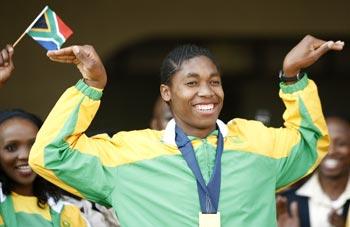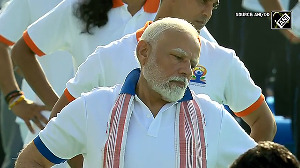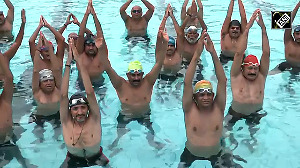World champion South African runner Caster Semenya, whose victory has been overshadowed by a gender testing row, returned home to a heroine's welcome on Tuesday.
Furious South Africans have accused the International Association of Athletics Federations (IAAF) of everything from racism to imperialism for ordering a test after her rapid improvement over the last year raised its suspicions.
 Semenya, 18, who won the women's world 800 metres title with a crushing performance in Berlin last week, was greeted by thousands of fans at Johannesburg's OR Tambo International Airport.
Semenya, 18, who won the women's world 800 metres title with a crushing performance in Berlin last week, was greeted by thousands of fans at Johannesburg's OR Tambo International Airport.
Some fans held up placards reading "Casterology Science of Running" and "Caster First Lady of Sport."
South Africans have rallied around their star athlete. But the controversy may have also touched a raw nerve in a country where race is still a highly sensitive issue after decades of apartheid, which ended in 1994.
Julius Malema, firebrand leader of the ruling ANC's militant Youth League, complained that not enough whites turned up at the airport to show their support for Semenya.
"Where are the white South Africans? ... If it was rugby they were going to be here," he told the crowd, referring to the white-dominated sport.
It may be a tense few weeks for Semenya, an 18-year-old from a rural village, until results of the gender test that has thrust her under the international spotlight are announced.
"The way she is treated is unfair. But whether she is a man or woman she is still a champion," said prison worker Abigail Mqomboti, who took the day off to join the welcoming ceremony.
BAREFOOT RUNNER
Leon Bammau, secretary of Limpopo Athletics, told Rapport newspaper that Semenya was gender tested twice three years ago and passed both times after local school athletics authorities questioned her gender. He said she had been discovered as a barefoot cross-country runner.
Rapport said Semenya, speaking from Berlin, recalled that during school athletics meets she often had to go with a teacher to a bathroom so that her genitalia could be inspected.
South Africans say Semenya's broad shoulders and imposing musculature are common in women's athletics and she should not be singled out.
Laboratory and genetic testing were introduced at the 1968 Mexico City Olympics. There have been other high-profile cases.
Polish sprinter Stanislawa Walasiewicz, who won the women's 100 metres at the 1932 Los Angeles Olympics, was the most notorious one.
Walasiewicz changed her name to Stella Walsh and moved to the United States where she was shot dead in a robbery attempt in 1980. An autopsy showed she possessed male genitalia.
Indian Santhi Soundarajan was stripped of the Asian Games women's 800 metres silver medal after failing a gender test in Doha in 2006.
She was admitted to hospital in September 2008 following a suicide bid. She later announced she had turned to coaching.








